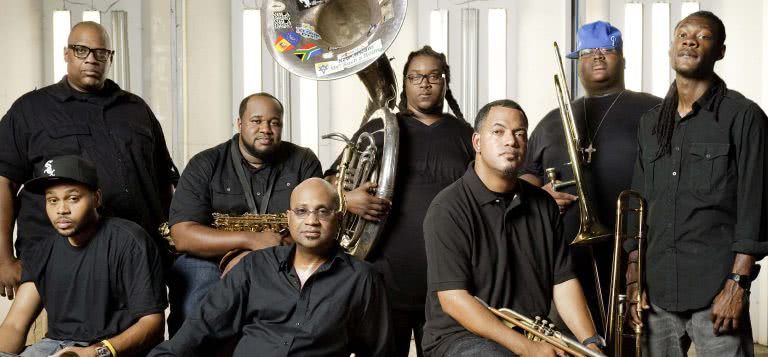Lumar LeBlanc from The Soul Rebels has one of the most evocative names you’re likely to come across in the next few paragraphs. Even more impressive is the man’s voice; a deep, New Orleanian blend of Barry White and Jesse Duplantis. He is charismatic and attentive, though one does get the impression that after innumerable interviews there’s nothing he hasn’t been asked before, and he’d rather get back to practising before the next tour is underway.
In fact, for the duration of our interview the sounds of rehearsal can be heard in the background – “How about we go like, say, one-two-three BOOMBOOMBOOM” – as the brass section comes alive and laughter slides between notes. It’s an interview and performance all in one, and it strikes me that with so much energy, so much spontaneity in an eight-piece band, perhaps LeBlanc might once have worried that the logistics of touring such an ensemble might become too great.
“Well, when you first start all you want is to play,” he rumbles. “When you play music and get paid for it, you realise that you’re a professional, but you don’t realise – and being so young when we started, we were all just doing it out of love – you don’t realise the truth about travelling, the heavy instruments, staying in hotel after hotel, waking up early to drive for hours on end, when all you really want to do is play your instrument.
“As you get older your management puts in all these different routines and schedules, and that lets you settle down some. We are a large group, but all of the guys are totally respectful of each other, because that’s the only way you can make it on the road for so long. You gotta respect and get along. It does get hard, sure. The luggage alone post-9-11, the security checks at the airports, it gets to be pretty hard. The reward is you get to play your instrument for fans. You get to keep giving that love through your music.”
One of the most common observations of The Soul Rebels in action is that they seem like some unusual party that somehow stumbled onto a stage, something thrilling and chaotic. Their audiences seem just as engaged, and the Rebels have developed a near-unassailable reputation as a band you have to witness live to truly appreciate.
“You have to be first mentally and physically fit to perform, because the tour schedule is so gruelling,” says LeBlanc. “You have to constantly create material, you have to be in tune with your body, your soul. We connect with the people, we kind of vibe off the energy of the people. From the outset, from the very first note of the show, we’re able to exchange or transfer that energy, and it all goes from there. I mean, we have a setlist that we’ll stick to, but we like to kind of be spontaneous with the energy of the people. It helps.”
It is through their collaborations with other acts that they first began to receive serious attention outside of New Orleans, and before he returns to rehearsals I ask LeBlanc about the invitation they received from Metallica to share the stage with them at the Fillmore in San Francisco for three consecutive nights. I swear I can somehow hear his face light up.
“Oh, it was a dream. It was euphoria! I mean, we really were focused on doing the job; we’d had to practise all the songs and be really intense with our focus. But on an inner, spiritual side, it was really a dream! I mean, I just couldn’t believe that here we are playing with Metallica, one of the greats of music, and they were so accommodating. I can’t tell you; it was just a great feeling, and that put us in another level, it really brought us into the public eye. So far I feel like we’re very blessed. I just hope we can continue to grow.”
See The Soul Rebels at The Basement on Wednesday April 16.
Also appearing alongside John Mayer, Dave Matthews Band, Devendra Banhart, India.Arie, Joss Stone, Jake Bugg, Passenger and many more at Byron Bay Bluesfest, Thursday April 17 to Monday April 21.


































